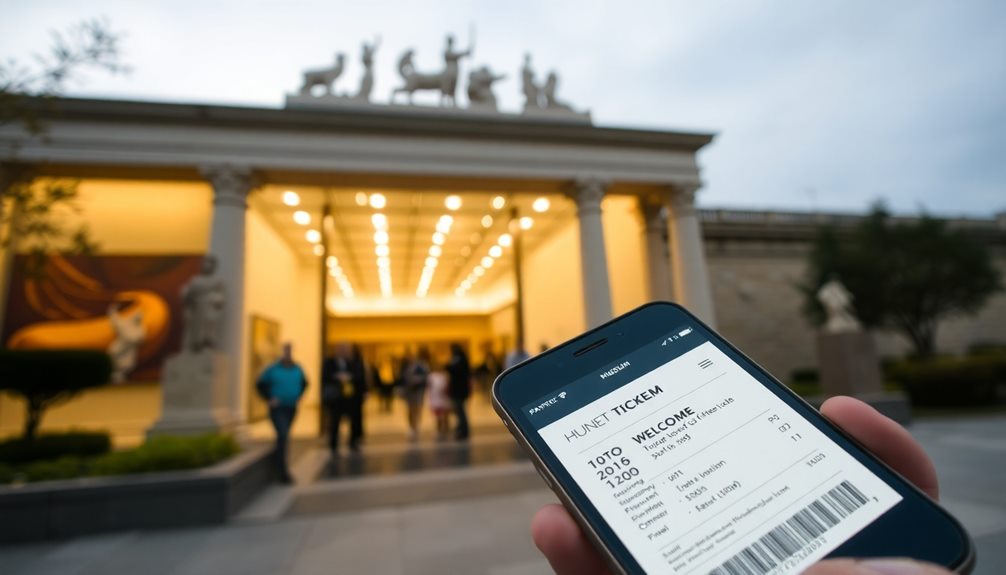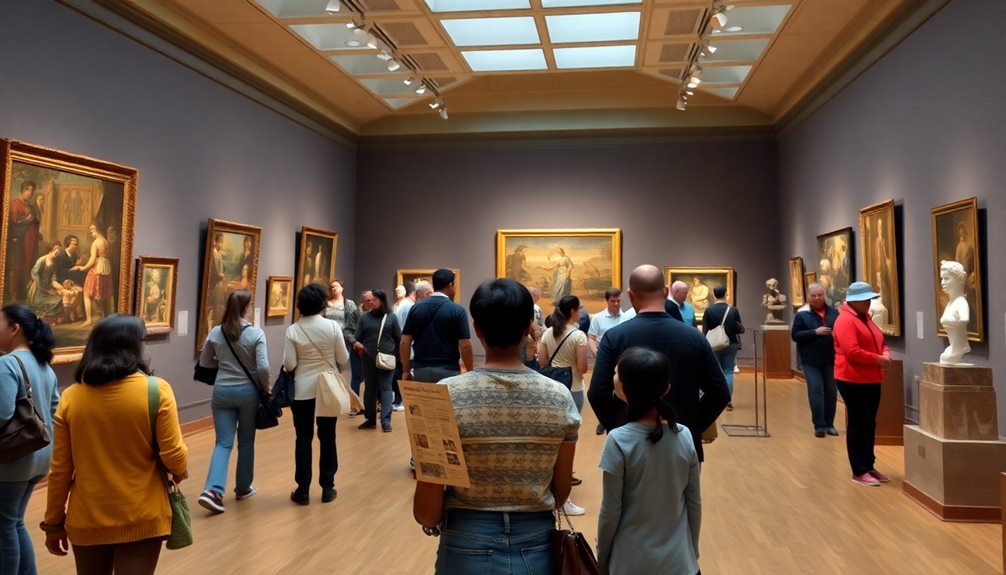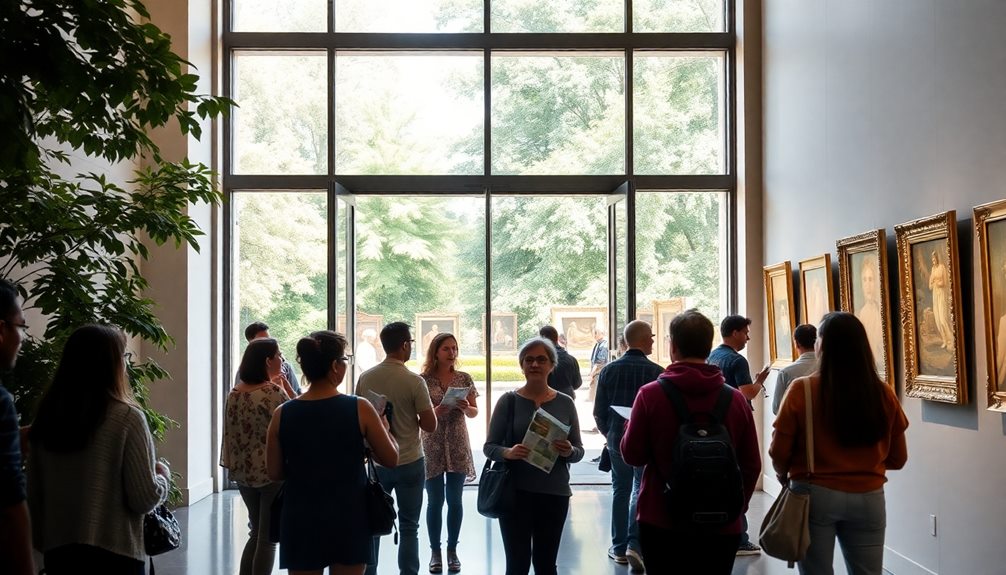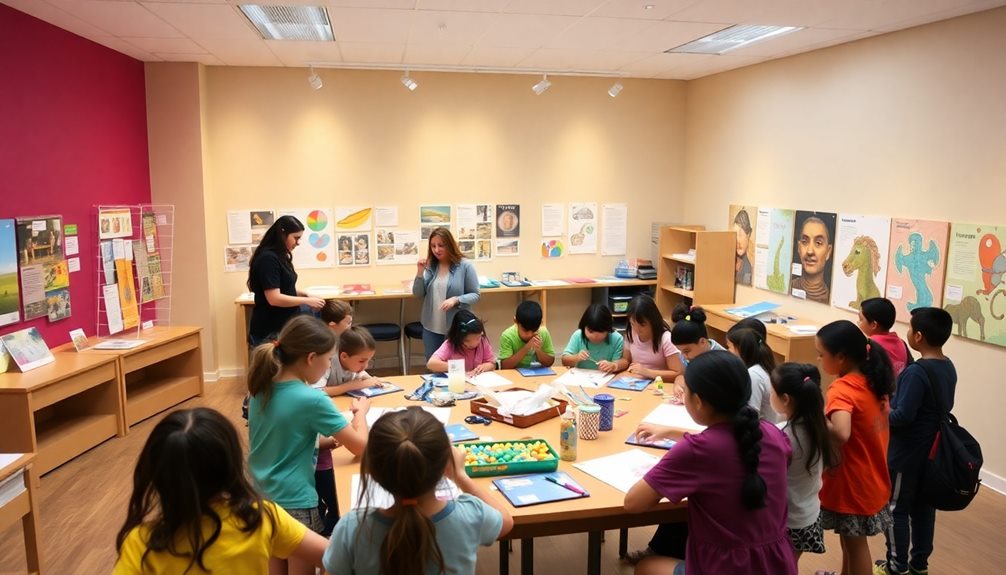To plan a museum visit, start by checking the museum's website for current exhibitions and events. Familiarize yourself with the layout and admission fees, and consider buying tickets online to save time. Choose a museum that aligns with your interests, whether it's art, history, or science. Prioritize must-see exhibits and plan to visit during off-peak hours. Consider guided tours for deeper insights and take breaks to reflect on what you see. Remember, effective planning enhances your experience and enjoyment, allowing you to fully appreciate each exhibit's significance. There's a lot more to explore about optimizing your visit.
Key Takeaways
- Research the museum's collections, exhibitions, and events on their website to tailor your visit.
- Buy tickets online in advance to avoid long queues and ensure entry.
- Plan your visit during off-peak hours to enjoy popular exhibits with fewer crowds.
- Utilize maps or apps for efficient navigation and prioritize key exhibits of interest.
- Reflect on your experience afterward through journaling or discussions to enhance memory retention.
Pre-Visit Preparation

Before you head out, it's crucial to do some pre-visit preparation to make the most of your museum experience. A great museum tip is to research the museum's website beforehand. Check out information on collections, exhibitions, and special events, along with opening hours and admission fees. This way, you can plan your visit to the museum effectively.
When you arrive, grab a map or look for suggested tour options. Familiarizing yourself with the layout and key exhibits enhances navigation and can help you avoid feeling overwhelmed.
Also, don't forget to check for discounts or special offers. Museums require you to be aware of available options for students, seniors, and families, which can save you money.
To maximize your experience, plan to visit popular exhibits first, ideally during off-peak hours. This way, you can fully appreciate your favorite displays without crowds.
Choosing the Right Museum

Choosing the right museum can greatly improve your experience, so it's essential to take into account your interests. If you're passionate about art, look for museums that feature renowned collections or upcoming exhibitions that excite you.
For history buffs, a museum dedicated to historical artifacts may be the perfect fit, while science enthusiasts might enjoy interactive science centers.
Before your visit, research museums in your destination city through their websites. Check out their collections, special events, and any family-friendly offerings if you're visiting with children.
Accessibility features are also important if you're bringing someone with mobility challenges, so make sure to find museums that cater to those needs.
Don't forget to check admission fees and discount options. Many museums offer reduced rates for students or seniors, and some have free days, maximizing the value of your visit.
Researching Exhibits and Collections

Researching exhibits and collections is a crucial step in maximizing your museum visit. Start by exploring the museum's website, where you can access detailed information about current exhibitions and any special events happening during your visit. This will give you a sense of what to expect and help you plan your time effectively.
Familiarize yourself with notable pieces by watching introductory videos or reading articles related to the museum's collections. This background knowledge enhances your appreciation and understanding of the art or artifacts you'll encounter.
Additionally, check if the museum offers educational resources, like guides or brochures, to provide context on key exhibits.
Visitor reviews and travel forums can be priceless for insider tips on must-see exhibits. These insights let you gauge which collections resonate most with previous visitors.
Ticketing and Entry Tips

When planning your museum visit, buying tickets online can save you time and hassle, allowing you to skip the long queues.
Consider opting for guided tours if you want a more in-depth experience, as they can enhance your understanding of the exhibits.
Make sure to check if there are any special ticket options available that fit your schedule and interests.
Online Ticket Purchase
Online ticket purchases have become a game changer for museum visits, allowing you to bypass long lines and gain quicker access to the exhibits. By opting for an online ticket purchase, you can substantially reduce waiting times, especially at popular museums where queues can stretch for blocks.
Many museums also offer discounted rates for online purchases, including family packages and special promotions, which can lead to considerable savings.
Before you finalize your purchase, it's crucial to confirm the type of ticket you're buying—whether it's general admission, timed entry, or for a special event. This will help you avoid any confusion upon arrival.
To guarantee a smooth entry, keep a digital or printed copy of your tickets handy; this way, you'll have easy access in case of any discrepancies.
Additionally, some museums allow for ticket modifications or refunds if purchased online, so be sure to review their policies before completing your transaction.
Guided Tour Options
Guided tours can transform your museum visit into a fascinating journey through art and history. To make the most of your experience, consider these options:
| Tour Type | Benefits | Tips |
|---|---|---|
| Standard Guided Tour | Insightful context from knowledgeable staff | Book in advance to avoid limited time spots |
| Audio Guide | Explore at your own pace with informative commentary | Often available for free or low cost |
| Private Tour | Personalized attention on specific interests | Ideal for in-depth exploration |
| Family Package | Special discounts on guided tours for families | Check the museum's website for deals |
| Themed Tours | Focused experiences on specific topics | Great to avoid museum fatigue |
Planning Your Visit

Before you head to the museum, check out its website for details on current exhibitions and admission fees.
This way, you can tailor your visit to match your interests and budget. Knowing what's on display and any special events can really enhance your experience.
Research Museum Offerings
A successful museum visit starts with thorough research into what the institution has to offer. By taking the time to explore the museum's website, you can tailor your experience to fit your interests. Here are some key aspects to research:
- Current Collections and Temporary Exhibitions: Check what's on display during your visit. Special exhibitions might pique your interest and offer a unique experience.
- Educational Resources: Look for online articles, videos, or virtual tours available on the museum's site. These can enhance your understanding of the exhibits before you even step foot inside.
- Family-Friendly Programs: If you're visiting with kids, find out about workshops, guided tours, or interactive stations designed to engage younger audiences.
Additionally, familiarize yourself with the museum's layout through available maps or apps. This will help you identify key exhibits and plan an efficient route.
Don't forget to investigate any discounts or special offers, like free admission days or student rates, to make your visit more affordable.
Check Admission Details
Planning your visit to a museum involves more than just deciding what to see; you also need to check admission details. Start by researching the museum's website for information on admission fees. Many museums offer discounted rates for students, seniors, and children, which can help you save on costs.
Additionally, look for special days or events when the museum might provide free admission or reduced ticket prices, making your visit even more budget-friendly.
If you're a member of another museum, check if they've reciprocal membership programs that offer access to multiple institutions at a reduced rate. This can be a fantastic way to explore more without breaking the bank.
Don't forget to verify the museum's operating hours, as these can vary by day and may include extended hours for popular exhibitions or events.
Consider purchasing tickets online in advance to avoid long queues at the entrance, especially for popular museums with high visitor traffic. By checking these admission details, you'll guarantee a smoother and more enjoyable experience while visiting the museum.
Maximizing Your On-Site Experience

To truly maximize your on-site experience at a museum, start your visit with a physical map or an app that guides you through the space. This will help you navigate efficiently and prioritize key exhibits that interest you, preventing feelings of being overwhelmed.
Remember, the average visitor spends only 29 seconds with an artwork, so take your time to engage with pieces that resonate with you.
Here are three tips to enhance your museum experience:
- Take Breaks: Combat fatigue by taking breaks during your visit. This allows you to reflect on what you've seen and recharge for further exploration.
- Engage with Friends: If you're visiting with companions, engage in conversations about the exhibits. This can stimulate curiosity and lead to shared insights that enrich your understanding of the art.
- Consider Tours: Opt for guided or audio tours. Knowledgeable guides provide context and insights, enhancing your appreciation of the exhibits in a great museum.
Engaging With Tours and Guides

When you visit a museum, engaging with tours and guides can greatly enhance your experience.
Guided tours offer valuable insights and help you understand the context behind the exhibits.
If you prefer to explore at your own pace, consider using self-guided audio tours for expert commentary that fits your interests.
Guided Tour Benefits
Guided tours can considerably enhance your museum experience by offering in-depth insights that self-guided exploration often lacks.
With knowledgeable guides at your side, you'll receive expert commentary that brings exhibits to life, helping you understand their historical context and significance.
Here are three key benefits of opting for guided tours:
- Engaging Anecdotes: Guides often share intriguing stories and lesser-known facts about artworks and artifacts, enriching your connection with the pieces.
- Personalized Attention: Private tours allow for tailored discussions based on your interests, ensuring a more impactful experience as you explore deeper into topics that fascinate you.
- Efficient Navigation: Booking a guided tour helps you navigate large museums effectively, allowing you to see key exhibits without feeling overwhelmed or missing important highlights.
Self-Guided Exploration Tips
While guided tours offer a wealth of knowledge, self-guided exploration can be just as rewarding, allowing you to tailor your experience to your interests and pace.
To enhance your museum trip, consider downloading audio tours available for free or at a low cost. These often provide detailed insights that enrich your visit.
Before you go, take some time to research self-guided tour options. This way, you can engage more deeply with the collections at your own pace.
Additionally, utilize museum maps or apps to plan a route through the exhibits, ensuring you focus on areas that excite you and avoid feeling overwhelmed.
Don't hesitate to engage with museum staff and docents. They can offer valuable context and answer questions about specific exhibits, making your exploration more informative.
When you're at the art museum, remember to take the time to closely observe individual pieces. Spending just a few extra minutes can lead to a deeper appreciation of the artwork's details and context.
With these tips, you'll create a meaningful and personalized experience during your self-guided exploration.
Post-Visit Reflection and Documentation

After your museum visit, taking time to reflect on your experiences can deepen your appreciation for the exhibits. Engaging in post-visit reflection allows you to connect emotionally with what you've seen and enhances your retention of the experience.
Here are three effective ways to document your thoughts:
- Journal or Sketchbook: Dedicate a few moments to jot down your feelings about specific pieces that resonated with you. This practice solidifies your memories and offers a chance to revisit your thoughts later.
- Take Photos: Capture moments from your visit. Whether it's the art, the architecture, or the ambiance, photos serve as visual reminders of what intrigued you, sparking further reflection.
- Share Your Experience: Talk about your visit with friends or family. Engaging in discussions can uncover new perspectives and deepen your understanding of the exhibits.
Additionally, consider creating a scrapbook that includes tickets, brochures, and your favorite photographs. This tangible reminder not only celebrates your experience but also encourages future visits.
Community Involvement and Membership

How can you deepen your connection with a museum beyond just a visit? Consider becoming a member. Memberships often include benefits like free admission for a year, exclusive newsletters, and discounts for family and friends, making it a cost-effective option for frequent visitors.
Your membership plays a crucial role in community support, helping sustain educational programs and outreach initiatives that engage local audiences.
Many museums also participate in programs like Museums for All, which provide free or reduced admission to underserved communities. This commitment to inclusivity guarantees that everyone has access to cultural experiences. By joining, you not only enhance your own visits but also contribute to a shared mission of accessibility.
Additionally, memberships often grant access to reciprocal arrangements with other institutions, allowing you to explore multiple museums at reduced rates.
Engaging in community events and membership programs can lead to unique opportunities for learning, networking, and participating in cultural discussions. This involvement enriches your overall museum experience and strengthens your connection to the vibrant community surrounding these cultural institutions.
General Tips for Museum Visits

To make the most of your museum visit, it's essential to plan ahead and focus on what truly interests you. Whether it's art and artifacts from a specific period or a particular artist's work, narrowing your focus can prevent museum fatigue and enhance your experience.
Here are some tips to help you enjoy your time:
- Prioritize Exhibits: Choose 3-5 specific exhibitions you want to see. This helps you concentrate and appreciate the details without feeling overwhelmed.
- Buy Tickets Online: Avoid long lines by purchasing tickets in advance. Popular museums often have significant wait times, especially during peak hours.
- Dress Comfortably: Wear comfortable shoes and dress appropriately for the museum's climate. You'll likely be walking and standing for extended periods, so comfort is key.
Allocate around 1-3 hours for your visit, allowing time for breaks and reflection on individual pieces.
It's perfectly fine to take your time and truly absorb the art and artifacts around you. With these tips, you're set for a fulfilling museum experience!
Frequently Asked Questions
How to Plan a Museum Trip?
To plan a museum trip, research exhibitions and hours online, buy tickets in advance, create a focused itinerary, visit during off-peak times, and use a map or app to navigate efficiently. Enjoy your experience!
How Do You Plan a Museum?
To plan a museum, you should research exhibitions, check admission fees, and buy tickets online. Create a list of must-see exhibits and visit during quieter times for a more enjoyable experience. Don't forget to navigate effectively!
What Are the Five Types of Museum Visitors?
You might not realize it, but museum visitors come in five distinct types: the Casual Visitor, Knowledge Seeker, Family Explorer, Art Enthusiast, and Completionist, each bringing their unique approach to experiencing art and history.
How Do You Engage Museum Visitors?
To engage museum visitors, focus on their interests, offer interactive exhibits, provide guided tours, incorporate technology for deeper insights, and create opportunities for discussions. These strategies make the experience more enjoyable and memorable for everyone involved.
Conclusion
As you wrap up your museum visit, take a moment to reflect on what you've seen and learned. Did you uncover a hidden gem that sparked your curiosity? Maybe you'll join a community of fellow art enthusiasts or revisit those enchanting exhibits. The adventure doesn't have to end here; there's always more to explore. So, what will your next museum journey reveal? The possibilities await—dare to discover them!









